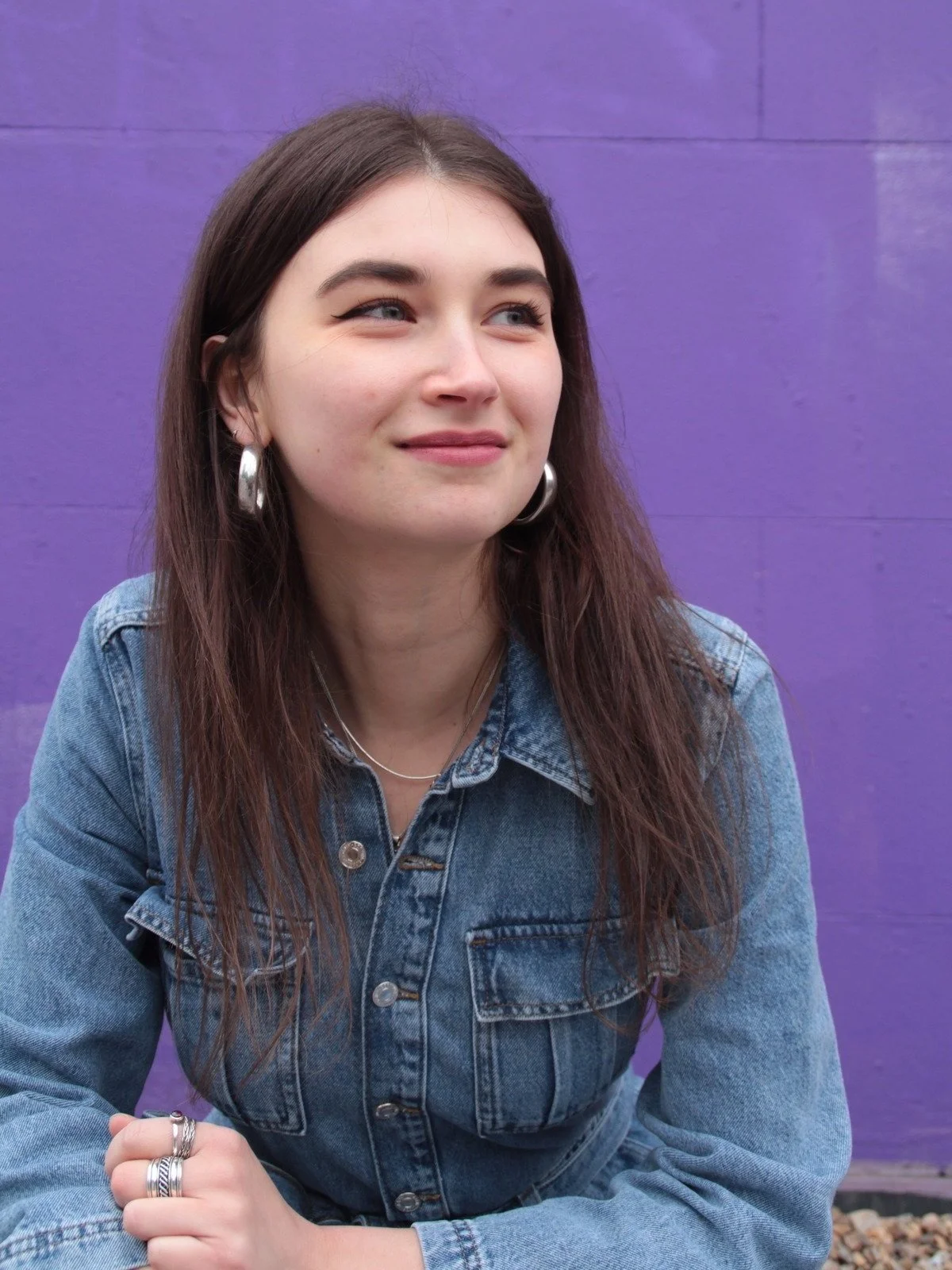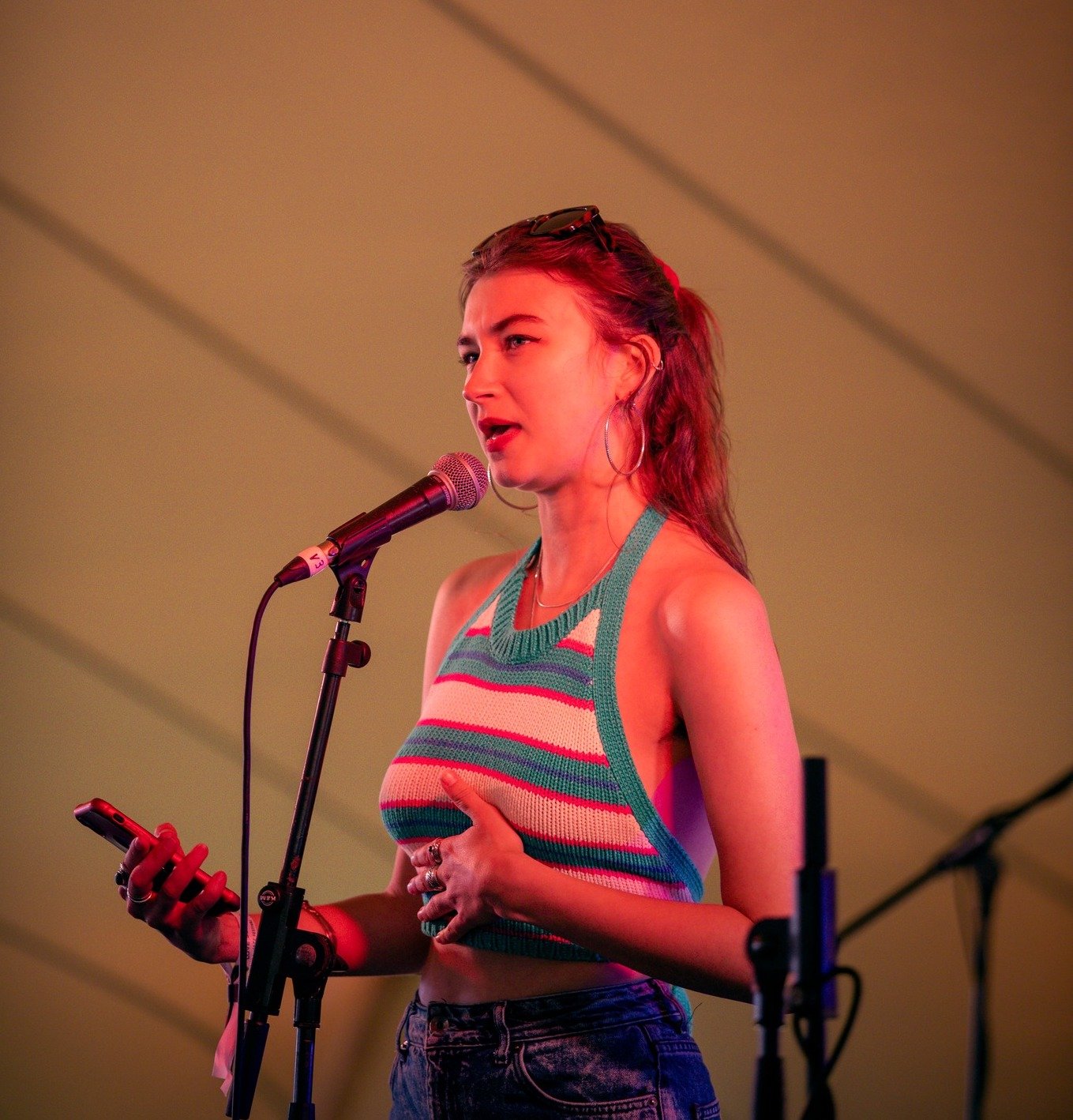Ella Dorman-Gajic
A genuine multi-hyphenate, Ella Dorman-Gajic chats to us about her new short film about women’s football, her published play Trade and meeting the Lionesses.
When did you know you were seriously interested in writing and filmmaking?
I don’t know if there was a specific pivotal point where I thought “Yeah, I want to do this”, I think it was just a genuine curiosity for expressing myself through writing. I came into the creative industries as an actor when I was younger. I started to read plays and poetry and went to see a lot of spoken-word poetry - I was so inspired by the possibilities of theatre and live performance, and of expressing my myself through storytelling. That was when I was about 18 or 19 - certain writers had a big impact on me, such as Kae Tempest, who is such a multi-hyphenate and does many different things from writing poetry to novels and plays, and I became interested in writing in many different forms, depending on the themes I was exploring and what I wanted to express. I think some things work better in a poem, some things I want to write a short film about…
When did you begin acting? Do you still act?
Yeah, so I actually just finished filming for a short film about football, called Back Of The Net, which I wrote and I’m also acting in - I’m the main part in that, which is slightly terrifying! I love acting, I love performing so much, but I think I knew quite early on that I wanted to create my own work - I think I was afraid that pursuing solely acting would limit me. What I enjoy so much about acting is the collaboration, being in a rehearsal room with other actors and a director, which you don’t always get with writing, as writing can be a bit isolating. I like to bounce ideas around which I think is why I’m so interested in live performance and film as it’s so collaborative, as opposed to, say, writing a novel, which I imagine can be very isolating!
Back Of The Net has been crowdfunded - have you taken that route for any other projects?
No, this is actually the first one in quite a few years. My first-ever venture into creating my own work was a poetry theatre show, for the Brighton Fringe in 2016, so I ran a crowdfunder just to raise a grand. It wasn’t to the same extent as Back Of The Net. Since then I’ve been fortunate enough to get a few Arts Council grants - much of my time is spent writing applications for them! I’ve been lucky enough to get four in the last few years, so much of my work has been funded through those. The Arts Council doesn’t fund film projects though, so with Back Of The Net we decided to crowdfund - I worked with some amazing producers, and it’s great that so many people wanted to support it.
Do you always know the best medium to tell a story in or does it sometimes take a while to figure out?
Up until recently I’ve only really been writing plays and poems - venturing into screenwriting professionally is newer terrain for me - but for example with Back Of The Net I started writing poems about football because I’d started playing it, then this narrative idea came to me and I was like “Alright, I think this very much belongs in a film”, because football is so visual and I could imagine the locations. But in the past I think it has been pretty instantaneous, because if it’s been a narrative and character-driven it’s been a script, but if I’ve been trying to express a specific emotion or theme it could belong better in a poem - obviously there are crossovers though. Generally my poetry stuff tends to be more hyperpersonal stuff, speaking confessionally through poetry, whereas my scripts can be inspired by life experiences but are usually more fictionalised.
Have you written any literature?
I don’t normally write in prose form, but I’d love to write a novel one day! I think when I get more content with being alone for a long while, because that’s what you need, a lot of alone time.
Aside from your first-ever show have you performed much fringe theatre?
I have, several times. I took my first show to the Edinburgh Fringe too - not for the entire length of the festival, I think it was just a two-week run - and that was a very formative experience. I learnt a lot there, not just like seeing an audience response but also what it takes to produce a show and all of the marketing - I was doing it very DIY, and I picked up a lot of skills in how to market a show, how to bring all the elements together. I think that really informed how much I know about how to bring together a show from scratch essentially.
Do you normally promote your work yourself now?
So for Trade, my most recent show, which had a UK tour funded by the Arts Council, I was heading the marketing for that but we had support from a social media assistant, which was really helpful. When you’re marketing a tour, you’re marketing new audiences, you don’t always have an existing fanbase or connections in these cities you’re going to - we were going to Exeter, Nottingham, Birmingham, and knew nobody. It’s a hard thing to do, going on tour, especially with theatre productions, as there’s a different mentality with theatre from city-to-city.
What was Trade about?
Trade explored an underground world of sex trafficking, set after the Bosnian war, and it’s about a young woman who’s just fallen in love and is ready to leave for a new life in London, and it’s about her being pulled into this underground world where very traumatic things happen to her. It deconstructs her as a “perfect victim” and how she becomes quite complicit in a lot of the things that happen to her, so it’s about her climbing the ladder and the mechanisms at play in this obviously very poisonous environment. It’s a morality play, basically. I won’t give away the ending! You can buy the playtext, it’s published with Salamander Street.
Was that the first time you’d taken a play on tour? How wide did it go?
The tour lasted from 20th of March to the 13th of April. This was the first time I’d taken a play on tour, yeah, and some were wildly successful - we sold out at the Pleasance Theatre in London, for example, did pretty well in Nottingham and Exeter, and we sold in Norwich as well, days in advance. I definitely want to do it again, I absolutely loved it and it was such a rewarding experience. I want to massively thank the whole team who were involved, the amazing actors and director Maddy Corner. We raised money throughout the tour for an anti-trafficking charity called Unseen, and we managed to raise a lot of money for them.
You mentioned that you play football - just as a hobby or something more serious?
Just a hobby! I play for the Deptford Ravens, and I’ve recently started playing for Bend It Like Peckham - I’ve been playing on and off since the beginning of this year, but I used to play a bit at school as well. I just love it, I love the sense of community and I think it’s really taken off for women since the Euros last year, which is just fantastic - this was a massive inspiration for Back Of The Net. I met the Lionesses recently - we have a new executive producer on Back Of The Net, Jean Williams, she’s a football historian and journalist and I reached out to her because her name kept popping up in all the research I was doing, and she loved the script and wanted to be involved, and offered to connect me with the Lionesses! The next week I was taking a train out to St George’s Park and meeting Jill Scott - it was an incredible turnover of events! That was genuinely one of the most incredible experiences of my life so far.
Words:: Scott Bates
Follow Ella on Instagram and Twitter
Ella’s website can be found here
Buy the playtext for Trade


